Exploring the Diversity of Waste Processed in Industrial Waste Incinerators
2024-03-05
In the realm of waste management, industrial waste incinerators serve as pivotal facilities for the treatment and disposal of various types of waste materials. These facilities are designed to thermally process a wide range of waste streams, each with its unique characteristics and challenges. In this blog, we'll delve into the diverse types of waste typically processed in industrial waste incinerators, shedding light on their composition, sources, and environmental implications.
Introduction to Industrial Waste Incinerators
Industrial waste incinerators are specialized facilities equipped to handle different types of waste materials generated by industrial, commercial, and institutional activities. These facilities utilize high temperatures to combust waste and reduce its volume, while also recovering energy from the process. Let's explore the types of waste commonly processed in industrial waste incinerators:
1. Hazardous Waste
Hazardous waste encompasses a broad range of materials that pose risks to human health and the environment due to their chemical, biological, or physical properties. These include:
- Chemical waste: Solvents, paints, pesticides, acids, and other chemical products used in industrial processes.
- Pharmaceutical waste: Expired or unused medications and pharmaceutical products from healthcare facilities.
- Laboratory waste: Chemicals, reagents, and contaminated materials generated during laboratory experiments and research activities.
2. Medical Waste
Medical waste consists of materials generated by healthcare facilities, laboratories, and medical research institutions. This includes:
- Infectious waste: Used needles, syringes, bandages, and other materials contaminated with blood or bodily fluids.
- Pathological waste: Tissues, organs, and other biological specimens from medical procedures and surgeries.
- Pharmaceutical waste: Expired medications, chemotherapy drugs, and other pharmaceutical products.
3. Municipal Solid Waste (MSW)
Municipal solid waste, or MSW, refers to household, commercial, and institutional waste collected from communities. While most MSW is disposed of in landfills, some portions may be processed in industrial waste incinerators. MSW typically includes:
- Organic waste: Food scraps, yard trimmings, and other biodegradable materials.
- Paper and cardboard: Newspapers, magazines, packaging materials, and other paper products.
- Plastics: Bottles, containers, packaging, and other plastic products.
4. Industrial By-products
Industrial waste incinerators also process various by-products and residues generated by manufacturing and production processes. These may include:
- Sludges and residues: Wastewater treatment sludges, ash from industrial boilers, and other by-products of manufacturing operations.
- Scrap materials: Metal scrap, glass cullet, and other recyclable materials separated from industrial waste streams.
Conclusion
In conclusion, industrial waste incinerators play a crucial role in processing a diverse array of waste materials, ranging from hazardous and medical waste to municipal solid waste and industrial by-products. By subjecting these materials to controlled combustion at high temperatures, industrial waste incinerators reduce waste volume, eliminate hazardous substances, and recover energy for beneficial use. However, it's essential to ensure that incineration processes are conducted in compliance with environmental regulations and safety standards to minimize impacts on public health and the environment. As waste management practices continue to evolve, industrial waste incinerators will remain integral components of sustainable waste management strategies, contributing to the conservation of resources and the protection of our planet.


